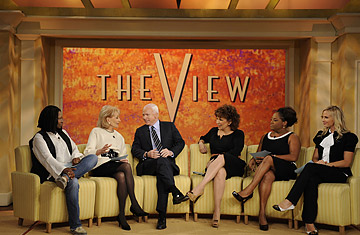
No one would confuse ABC's The View with a serious news program. First, because when former President Bill Clinton appeared on the show on Sept. 22, the five-woman panel began the hour by discussing the merits of pantsuits vs. skirts. Second, because the NewsHour probably does not employ a staffer who, as View panelist Sherri Shepherd said on air, does not know whether the earth is flat. And finally, because when Joy Behar questioned John McCain on a Sept. 12 episode about campaign ads of his that she believed were lying, she used the word lie.
Serious news organizations do not do this! They say "misleading." They say "pushing the envelope." If they're feeling especially feisty, they might note, "Some say this is a lie." But they do not call what they believe to be a lie, a lie. At least not until the camera light goes off.
The View tends to get tossed into the category of "soft" media. But that raises the question, When The View gives an increasingly press-shy candidate his toughest interview in a while, when it and David Letterman prod the scars of the Democratic primary in interviews with Clinton, when pundits debate the fairness of Us Weekly covers and when Saturday Night Live crystallizes the discussion of sexism and vice-presidential choices, what's so soft about them?
This campaign was tailor-made for The View. Like the show, it is saturated with identity politics, it is driven by issues respectable journalists are uncomfortable discussing openly, and from time to time, it becomes something of a train wreck. From the primaries to Sarah Palin, 2008 has been a year of topics — from working motherhood to Americans' inter- and intraracial attitudes — that the still mostly white and male journalistic élite have had to handle nervously with tongs.
Not so The View, which has a personal-is-political philosophy and five women panelists, two of them African American. It jumped into the Palin controversies lustily, and in a June interview with Michelle Obama, Whoopi Goldberg raised the subject of the lack of media role models for dark-skinned black women. (Anyone who thinks that diversity in TV news is strictly a cosmetic issue should try to imagine Charlie Gibson asking about that.)
The View's hosts (including executive producer Barbara Walters) get away with this because they do what the more fettered media believe they can't: address issues people actually care about — as opposed to those the respectable media care about — and say what they actually think. Once upon a time, journalists' circumspection was a source of authority; increasingly, it just seems like phoniness. And while traditional media are trying to adapt to a bloggier, more opinionated age, they're still largely accustomed to the old standards of equivalency: the notion that if candidate X commits a transgression, "balance" requires that you find an equivalent from candidate Y — or at least an X supporter willing to claim one.
The View — like blogs, like Jon Stewart and Stephen Colbert — has no such problem. Are its panelists biased? Sure! They talk about their opinions all day. Goldberg and Behar are plainly pro — Barack Obama; Elisabeth Hasselbeck is an avowed conservative. Yet their interviews are actually newsworthy; Behar got McCain to go on the record supporting his surrogates' attack on Obama's "lipstick on a pig" remark, and Hasselbeck, in a March interview, pressed Obama for seven minutes on the Rev. Jeremiah Wright controversy.
Granted, in that same interview Walters called Obama "sexy," which would have been a mite awkward coming from Wolf Blitzer. And Goldberg asked McCain if his support of strict-constitutionalist judges meant that she should be worried about the return of slavery, apparently unaware that the Constitution does ban slavery. But there are still things that traditional journalism could learn from The View.
First, that transparency works: you know what the panelists believe and can judge their work accordingly. (If anything, The View would benefit from Walters dialing down her studied neutrality even more.) Second, that you can speak truth to power and, if you have a following, power will still have to come back to reach your audience. (You could call this election's crucial swing bloc Wal-Mart moms or mortgage moms — or you could just call them fans of The View.) And finally, that a confrontational interview is not necessarily a bad one. (Similarly, Obama probably did himself more good in his combative interview with Fox's Bill O'Reilly than in his softball talk with msnbc's Keith Olbermann.)
Or in the words of Amy Poehler as Hillary Clinton — on that supposedly soft outlet SNL — "I invite the media to grow a pair." Of which there are five examples every weekday morning on ABC.
